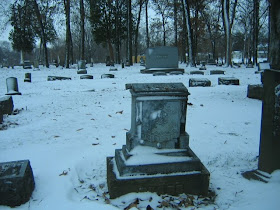I am not sure why "zinc headstones" is such a popular heading on waymarking.com. I found a bit of information about these zinc headstones on a different site:
White Bronze - ZincSo you probably want to know where to find these three special grave markers. You can use a GPS unit, or follow these directions. Enter Weston Cemetery from the eastern entrance and when the road splits, take the right fork. It turns to the west and then back to the south. As you walk south, look for a bench tombstone on the right, where there are only a few graves. It should have the name "Hopkins" on it, and on the east (left) side of the road there should be a marker with the name "Fitzhugh." At this point you leave the road and walk east toward three tall markers five or six rows in. The first of our targets, the Susan Jane Humes marker, is in the row before the three tall markers.
There are many monuments in Mt. Hope that appear to be made of a bluish gray stone. These monuments are actually made of molded metal! The material was called White Bronze to make it more appealing to customers, but it is actually pure zinc. Left exposed to the elements the monuments rapidly form a tough and very durable skin of zinc carbonate that protects the underlying metal. The zinc carbonate is what gives the monuments their characteristic bluish gray color. The monuments were erected in cemeteries across the entire United States (including Hawaii) and Canada.
These monuments were ordered from a sales agent with a catalog, and were very inexpensive. The price range for these monuments was from about $6 for a single cast tablet, to as much as $5,000. The White Bronze markers copyied the same shapes and styles as marble and granite monuments, but the stone monument dealers seldom sold the metal monuments. The back of the catalog featured an ad asking people to become sales agents with "No capital investment needed."
 Here is a close up that I took while looking for statues and before I realized that this was a zinc headstone.
Here is a close up that I took while looking for statues and before I realized that this was a zinc headstone. If you have found this one, the other two are easy. Go to the row of the three tall markers and walk south about twenty yards. You will find the Anna Sears marker. In the picture below, the Sears marker has a tilt. If you continue to the right the line that the top of Sears marker makes, the first marker you will hit is the Humes marker.
If you have found this one, the other two are easy. Go to the row of the three tall markers and walk south about twenty yards. You will find the Anna Sears marker. In the picture below, the Sears marker has a tilt. If you continue to the right the line that the top of Sears marker makes, the first marker you will hit is the Humes marker. Here is the front of the Sears marker. Note the large stone above it. Notice that there is a yellow building in the background to the left of this stone. (It is a lift station, part of the city's sewage system.) The King marker is the little marker in the picture that is in front of this building.
Here is the front of the Sears marker. Note the large stone above it. Notice that there is a yellow building in the background to the left of this stone. (It is a lift station, part of the city's sewage system.) The King marker is the little marker in the picture that is in front of this building. As we get closer, it is the obelisk in the middle.
As we get closer, it is the obelisk in the middle. And here is a close up.
And here is a close up. Here is the person who sent me on this scavenger hunt and who contributed many or most of the Rensselaer waymarks.
Here is the person who sent me on this scavenger hunt and who contributed many or most of the Rensselaer waymarks.
No comments:
Post a Comment
I have been getting too much spam lately so comments are now moderated and spam is deleted.